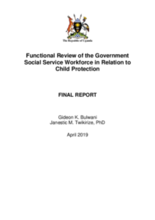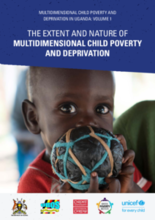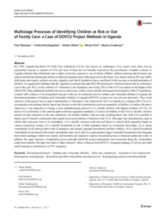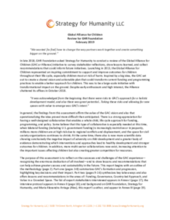This country page features an interactive, icon-based data dashboard providing a national-level overview of the status of children’s care and care reform efforts (a “Country Care Snapshot”), along with a list of resources and organizations in the country.
demographic_data
childrens_living_arrangement
children_living_without_bio
social_work_force
key_stakeholders
Key Stakeholders
Add New DataOther Relevant Reforms
Add New Datadrivers_of_institutionalisation
Drivers of Institutionaliziation
Add New Datakey_research_and_information
Key Data Sources
Add New DataThe Children Act (Uganda)
Country Care Review: Uganda
Prevalence and number of children living in institutional care: global, regional, and country estimates
The National Integrated Early Childhood Development Policy Action Plan (2016-2021) of Uganda
Catholic Care for Children in Uganda: A Family for Every Child - Findings from a Midterm Evaluation
Acknowledgements
Data for this country care snapshot was contributed by a consultant with the Data for Impact (D4I) Project at Palladium Group LLC.
Displaying 131 - 140 of 418
A recent media engagement on the effect of growing up in institutionalized care in Kampala, organized by Child’s i Foundation, revealed how children in orphanages are often mistreated, some even denied food, according to this article from New Vision.
This article investigates whether individuals who were orphaned as a child suffer long‐term consequences on their pro‐sociality.
This report presents the findings of the “Functional review of the Government social service workforce in relation to child protection," which aimed to inform efforts geared towards strengthening the functionality of the social service workforce in Uganda, taking into account changes in the legal and policy framework and global trends in social protection and child protection in particular.
This report represents the successful integration of multidimensional child poverty measures in national statistics. In doing so it provides a better understanding of child poverty in Uganda by augmenting Uganda’s rich tradition of poverty analysis with a more deprivation-centred analytical tool.
This article explores the agency enablers and the factors which hinder adolescents and emerging adults transitioning from care to adulthood, with an emphasis on the transition into work taking a case study of the Uganda Youth Development Link.
This open access paper documents the Deinstitutionalization of Orphans and Vulnerable Children in Uganda (DOVCU) project, articulating the logical steps that were undertaken to identify districts, Child Care Institutions (CCIs), Remand Homes (RH), sub-counties, and parishes to work with. It also seeks to categorically outline the inclusive process that was used to examine push and pull factors of family-child separation, identify households at risk of family-child separation “prevention households,” identify reunifying children and trace their households “reintegrating households,” and assess and classify in quantified terms the level of vulnerability in both at risk and separated households.
The purpose of this assessment is to reflect on the successes and challenges of the Global Alliance for Children (GAC) experience, a large-scale initiative to support and improve outcomes for children throughout their life cycle, especially children most at risk of harm.
At least 60 illegal orphanages and children's homes in Uganda are being funded by UK charities, church groups and volunteers, according to this article from BBC News.
This news post from Lumos highlights the recent BBC piece on "the vast sums of international funding that go to orphanages in Uganda, many of which are operating illegally."
In this segment from BBC Radio 4, File on 4 reports from Uganda on conditions in UK-funded orphanages where, in the worst cases, children are neglected, exploited and abused by orphanage staff, tourists, volunteers, and donors.




